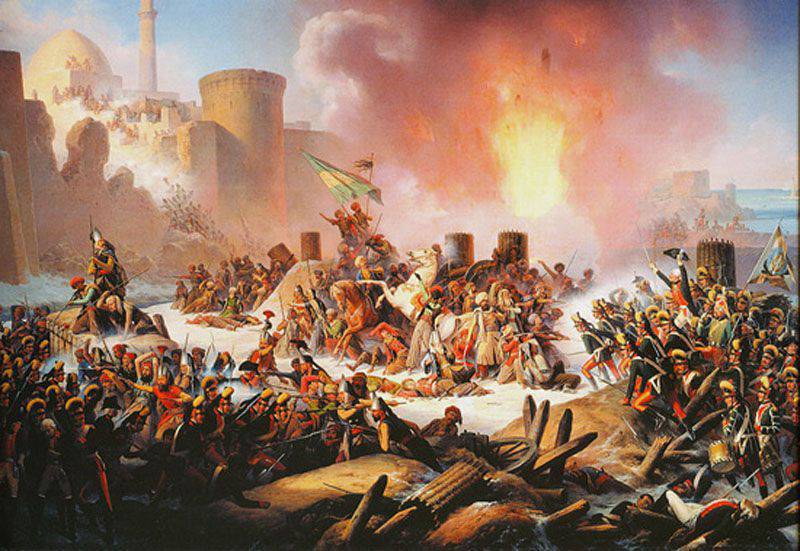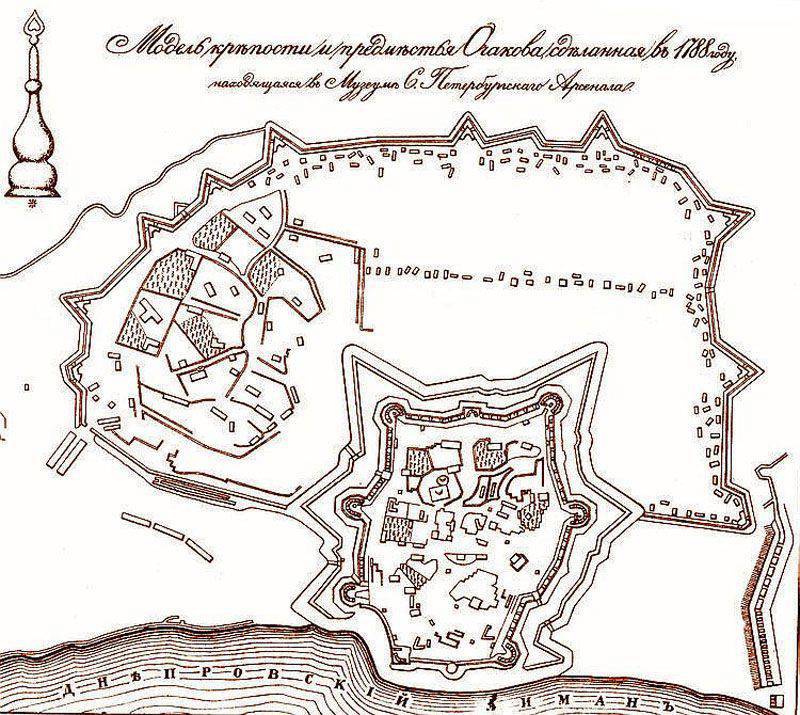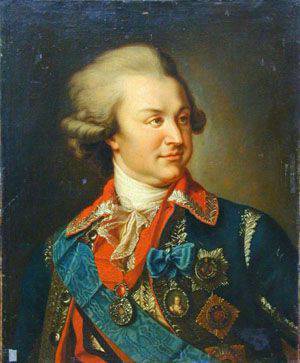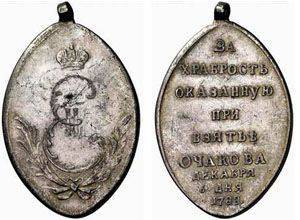Ochakovskaya Victoria

The Ottoman Empire left the Northern Black Sea region extremely painful and reluctant. The problem of unhindered access to the Black Sea loomed before Russia not for the first century, but only Peter I took up its resolution, rolling up its sleeves. The life of the carpenter emperor was interrupted early — only one “window” was cut in the blank wall surrounding Russia. The contours of the second were marked up, but descendants had to carry out Peter's plans.
Throughout the 18th century, Russia persistently strove to firmly stand on its southern frontier. In fact, it was one long, permanent conflict, where wars flowed into unstable and shaky truces, and these, in turn, were again and again replaced by hostilities. The huge Ottoman Empire, exhausted by internal problems, was still a formidable force. The next Russian-Turkish war, which ended with the signing of the Kyuchuk-Kaynardzhiysky Treaty, was a glorious, but still a stage in achieving the goal - access to the Black Sea.
Old fortress
Ochakov fortress, or Achi-Kale, more than once stood a cliff in the path of the Russian army. The value of this extremely conveniently located Turkish stronghold is hard to overestimate. He posed a threat to communications going to the Crimea, controlled the exit from the Dnieper-Bug estuary, was not only a large fortress, but also a parking lot fleet. Ochakov is an old fortress. In the XIV century, a commercial settlement was founded by entrepreneurial Genoese in this place, the Crimean Tatars took the baton in the person of Khan Mengli Giray, who built the Kara-Kermen fortress here. With the beginning of the XNUMXth century, the Ottoman Empire became the owner of the Northern Black Sea Region, and Achi-Kale (Achi - a corner, Kale - a fortress) became one of the key strongholds of Turkish expansion.
During the years of the Russian-Turkish war of 1735 – 1739, the Russian army under the command of Burhard Minich in July 1737, after a competent siege and prolonged bombardment, forced the fortress garrison to capitulate. A well-known baron Munchhausen was a participant in this military episode. True, the fortress was subsequently taken back to the Turks.

By 1787, Achi-Kale was significantly upgraded. The Turkish command made the proper conclusions from the lessons of the 1737 assault of the year. To improve the fortress, foreign specialists were attracted - French engineers were the best experts in the field of fortification in Europe, and it was for their services that it was decided to resort. The idea of thoroughly and regularly helping the enemies of Russia has always been not without its popularity with enlightened navigators and philosophers. Europe at that time (as always) was extremely beneficial for Russia to get bogged down in its Black Sea or, even better, in some Siberian problems. French officers helped to modernize the Turkish fortress, worked as consultants at naval shipyards, they often acted as instructors in the Turkish army. The sons of Albion did not lag behind in their zeal. So, the English ambassador in Istanbul beat Sultan Abdul-Hamid I to start a war with Russia, seriously promising that England would side with Turkey. Of course, the gentleman was lying.
But even without that, the relationship between the two empires was rapidly falling towards the inevitable war. The Turks could not simply accept the loss of the Crimea, their long-standing instrument of influence on the whole south of Russia, the revanchist sentiments, kindly warmed up in the wigs' ingratiating whisper, reached a high point. 5 August 1787 The Grand Vizier Yusuf Kocha summoned the Russian ambassador Bulgakov and presented him with an ultimatum: return the Crimea, annul all previous Russian-Turkish treaties, renounce patronage over Georgia. (By the way, Yusuf Kocha was born in Georgia and made the way from a slave to a Grand Vizier in the Ottoman Empire). Bulgakov did not even have time to pass an ultimatum to Petersburg - on August X, Sultan Abdul-Hamid I declared war against Russia on 12.
War again
The plans of the Turks provided for the landing of troops in the Crimea, in order to clear it of the Russians together with the insurgent Tatars. Then it was planned to destroy the Russian flotilla in the Dnieper-Bug estuary, destroy Kherson and the shipyards located there, and then begin the invasion of Ukraine from Moldova and Crimea. Aci-Kale was assigned the most important role in the beginning war - the fortress was the largest Turkish base in the Northern Black Sea region.
As has repeatedly happened, Russia did not have a clear plan for war. The speeches of the Turks were expected, but still it turned out to be sudden. Prince Grigory Alexandrovich Potemkin logically proposed to seize Ochakov, then take control of the coast between the Bug and the Dniester, in order to continue the advance on the Balkans. For these purposes, it was decided to form two armies: Yekaterinoslav under the command of Potemkin proper and the Ukrainian, which was assigned to Field Marshal Rumyantsev. The Yekaterinoslav army, which was the main force, was supposed to total 75 – 80 thousand people with 300 guns. The task of the Ukrainian army in 35 – 40 thousand people with 96 guns was to interact with the allied Austrian troops and the defense of Ukraine. For the defense of the Crimea and actions in the Kuban, a mobile Crimean-Kuban corps was formed in 20 – 25 thousand people. While these contingents were being formed, the general-in-chief Suvorov was instructed to organize the defense of the Crimea, the fortress of Kinburn and the approaches to Kherson. The Russian Navy on the Black Sea was represented by five battleships, nineteen frigates, one bombing ship and several dozen small ships. These forces were divided into the Sevastopol squadron and the Liman flotilla. In view of the small size of the ship group, she was ordered to take defensive actions with an emphasis on the defense of the Crimea.
Test of endurance
The Turks were the first to try to impose a tempo. On October 1, after several demonstrations of the fleet, they disembark the 5,5-thousandth troops, separated from the contingent stationed in Ochakov, on the Kinburn Spit to capture the fortress of Kinburn. Suvorov, the commander of the Russian forces in the area, was expecting a similar attack of the enemy - he gave the visitors a warm welcome, destroying the landing forces almost completely. It is curious that when inspecting the bodies of the murdered Turks, two disguised Frenchmen were discovered, and these were clearly not researchers of local folklore, but military advisers. When this news brought to the notice of the Empress, Catherine commanded that if such a case recurs, and some French are taken alive, then send them to Siberia to rest in order to discourage them from going to teach and instruct the Turks. Obviously, the empress was far from tolerance.

While the aforementioned events were taking place, Prince Potemkin, having completed the formation of the Yekaterinoslav Army, was in no hurry to go over to decisive hostilities. Neither in the autumn of 1787, nor in the winter of 1787 – 1788, he decided not to launch the siege of Ochakov. Inaction of the Most Serene allowed the Turks to bring the Ochakov garrison to 20 thousand people and strengthen the defense of the fortress with field fortifications. The number of guns located on the shafts and the transferee, reached 330 trunks. The fortress was surrounded by a deep moat to the depth of 7 meters. The pantries and powder cellars of Ochakov were significantly expanded, and they collected resources to supply the garrison with everything necessary for a long siege. At the head of the garrison was the three-armed Hussein Pasha.
By mid-May 1788, over 50, thousands of soldiers and officers were concentrated in the area of Olviopol (modern yet Pervomaisk). Having waited for the approach of numerous wagons and siege artillery parks, the Russian army began to move south. 25 May she crossed the Southern Bug and continued to move in the direction of Ochakov. Burdened by numerous rears, Potemkin traveled 200 versts in 33 of the day. Suvorov suggested that the commander, with the help of the Liman flotilla, take the fortress on the run, until the Turks came to their senses. But Potemkin decided to conduct a classical siege "according to the method" - with laying trenches and batteries. His plan was to build redoubts covering the flanks of the Russian army, and then erecting a number of siege batteries in order to force the garrison to surrender by methodical bombardment, as it was done by 50 years ago by Munnich. However, His Highness did not take into account the fact that the enemy also drew proper conclusions from his defeat, and the fortress was strengthened and equipped now with much better.
July 12 built the first battery on the Black Sea coast, and by July 20 the army completely overlaid the fortress. In early August, in order to prevent enemy attacks and cover up siege operations, two redoubts were built with artillery two kilometers from Ochakov. Undermining the enemy fortifications to dig was not possible because of the characteristics of the soil. The Turks did not remain passive observers - on July 29, apparently, for the purpose of reconnaissance in force, a cavalry detachment left the 50 man who attacked the Cossack picket. Behind the cavalry, at least 500 foot janissaries advanced. A small sortie, quickly overcoming the scale of the clash, began to grow to a battle. Reinforcements also approached the Russians - the company of the Fanagori regiment and the company of the grenadier, which drove the Turks away with accurate fire. The enemy, seeing how the matter was growing, also began to introduce one unit after another into battle, bringing the number of infantry on its part to three thousand. A crisis arose, and with a view to resolving it, the General-General of Suvorov, having built two Grenadier battalions in the square, personally led them to the attack. The enemy ran, and the Russians managed to capture several field fortifications. The general wanted to burst into the fortress on the shoulders of the Turks - the right moment was ripe for that. But Suvorov clearly lacked the available forces - he sends Potemkin orderlies with requests similar to demands to send reinforcements. The commander not only does not send any troops, but also demands to retreat. Thrice enraged, Suvorov demands help, three times he receives an order to retreat. The Turks, meanwhile, came to their senses and opened heavy fire. Having introduced fresh forces into the battle, the grenadier began to throng. Suvorov, who was wounded in the neck, had to surrender command to Lieutenant-General Bibikov, who was soon forced to give an order to retreat. In this battle, the Russians lost 154 people killed and 211 wounded. Some historians explain the reasons why the ambitious Potemkin did not help Suvorov with personal motives. Say, glory did not want to share. It is more likely that the methods of warfare, adopted by Alexander Vasilyevich, were too impudent, swift and dynamic for the cautious in military affairs of Potemkin. He was frightened by the volume and number of decisions that had to be made in a short period of time. The prince was a talented administrator, a man of a large and dynamic mind, but his military talents left much to be desired.
In addition to injuring Suvorov, he was severely reprimanded by the commander, who accused the general of excessive dashingness and useless losses from the point of view of Potemkin. The main argument of the prince was reduced to the value of the soldiers' lives, which greatly offended Suvorov himself, who was anxious about subordinates. A conflict arose between two extraordinary personalities, which Alexander Vassilyevich commented very sharply on the tongue with caustic puns such as: “I am sitting on a pebble, I look at Ochakov”. Naturally, helpful individuals brought Suvorov's puns to Potemkin’s attention, which, to put it mildly, did not improve the atmosphere at the top of the Russian army. In the end, Suvorov returned to Kinburn. The aged Rumyantsev spoke no less sharply: they say, Ochakov is not Troy, to besiege his 10 years. The general discontent with Potemkin’s activities during the siege of Ochakov grew. The famous condotier in the Russian service, Prince Nassau-Siegen, wrote to St. Petersburg about the missed opportunity to take the fortress in the spring.
Catherine was aware of the details of the Ochakov Seat and Potemkin's slowness, but the credit of trust in him was very high. The Most Serene began to organize a full-scale siege. Throughout August, Russian soldiers dug parallels and erected siege batteries that were supposed to bombard the fortress. The garrison tripled the number of sorties from time to time, alarming the besiegers. On August 18, a major clash took place with Turkish garrison forces trying to hinder battery construction. Having lost more than 500 people killed, the enemy retreated. Russian troops lost 150 people. It is noteworthy that in this battle, Major General M.I. received a second wound to the head. Kutuzov. The wound turned out to be serious, but fate kept the future field marshal for more serious matters. For the whole of August and September, a total of 30 artillery batteries were equipped with 317 siege and field artillery guns. The fire power of the Russian army was constantly growing. They burned a lot of gunpowder, consumed cores, but the Turks did not show signs of weakness - Hussein Pasha certainly refused all Potemkin’s ultimatums. The superiority of the Turkish fleet at sea allowed on November 1 to deliver thousands of reinforcements and necessary supplies by sea to Ochakov 1,5. A strong wind did not allow the Russian flotilla to leave the estuary and prevent this. Meanwhile, little by little the methodical bombardment gradually began to bring results. By early November, Turkish fortifications, especially at the front line, were badly damaged. Some of the buildings inside the fortress are destroyed. Having cruised, the Turkish fleet went to Istanbul for the winter, which could not but affect the morale of the garrison. It is known from history that a fortress with a fleet and a fortress without a fleet are two different situations. Taking advantage of the enemy’s withdrawal, the Russian rowing flotilla on November 7 landed a tactical assault on the island of Berezan, on which there was a small garrison, and captured it.
Nevertheless, the enemy constantly made attacks - especially large November 11 forces up to 2 thousand people. On the Russian side, Major General S.P. Maximov, three officers and nearly a hundred soldiers. Even to cautious Potemkin it became clear that the siege did not bring the corresponding results. On the nose was winter in the steppe, and Potemkin knew about the number of sanitary losses in the army of Minich, who stood here in 1737 year. The losses of his own army by the sick and those who have died of deprivation have long exceeded the fighting. The prospect of either wintering in the cold, windswept steppe, where even there was nothing to build capital housing for the soldiers, or to remove the siege and retreat to apartments became very clear. Failure Potemkin could not bear - it was completely unacceptable. He knew perfectly well what intrigues weave against him in Petersburg, who are persistently crowding at the door of the Empress's bedroom. He needed a victory. Reluctantly, the prince gives the order to prepare for the assault.
Assault
Frosts began in the second half of November. Under these conditions, the Russian army was preparing for an assault. His plan was Ivanovich Möller, who was in the headquarters of the Yekaterinoslav army, General-in-Chief of Artillery. For the mastery of the fortress were formed six columns. The first and second were to capture the citadel, the third struck from the north, the fourth - from the east side of the fortress. The fifth and sixth columns were in reserve and acted "by consideration of General Meller." Artillery training to ensure surprise, it was decided not to carry out.
All preparations were completed by the evening of December 5. At 7 in the morning of 6 in December 1788 of the year, on the day of St. Nicholas the Wonderworker, after a moleben during the frost in 23 degrees, Russian troops went to the assault on Ochakov. The Turks had a fierce and stubborn resistance - the attackers met with heavy fire. Column of Major General P.A. Palen wedged into the Turkish fortifications between the fortress and the citadel, the so-called castle of Hussein Pasha. Then he sent Colonel F. Meknob to attack the castle. The colonel and his men broke into the citadel, and the Turks who were there near 300 along with Hussein Pasha himself were taken prisoner. Holistic control of the defense of Ochakov was lost. The third column energetically attacked the earthworks, which was headed by Major-General Volkonsky, was killed. Colonel Jurgenz, who took command, brought her to the walls of the fortress. The fourth column under the command of Lieutenant-General Prince Dolgorukov, during a stubborn bayonet battle, broke through to the fortress gates, occupied and opened them. The Turks blew up two previously laid land mines, but this did not stop the assault.
The fifth and sixth columns, entered into the battle, struck gaps in the defense of the enemy and went directly to the bastions of the fortress. Part of the forces of the sixth column, commanded by Lieutenant Colonel Zubin, approached the southern side of the fortress on the ice of the Estuary. Moreover, the grenadiers dragged with a gun. Taking them to direct fire, under the cover of artillery fire, Zubin’s soldiers climbed onto the wall and captured it.
Downed from the walls, the Turks settled in the ruins of houses inside the fortress and put up fierce resistance. But the backbone of the enemy defense was already interrupted, it ceased to be organized. The remnants of the Turkish garrison were destroyed mainly as a result of a bayonet battle. Liberal historians love to complain about the "massacre" organized by the Russians in Ochakovo, forgetting about some of the details of the stay of Christians in Turkish captivity and the capture of the Turks of the cities. Lyric Mehmed II, who took Constantinople, did not interfere with composing poems mass slaughter of the Christian population. In Turkey, even filmed a very pretentious film on this event, without uncomfortable details, of course. In the ground battle of Abukir 25 July 1799, the French were driven into the water and virtually drowned under heavy fire from 10 to 11 thousands of Turks. Who will remember this? The war in the East was radically different from the battles of noble gentlemen in Europe. All gentlemen and chivalry after the transition through the Neman instantly evaporated.
Prince Potemkin observed the general course of the assault with one of the advanced batteries. When the captured Turkish commander Hussein Pasha was brought to him, His Highness attacked him with anger, saying that so much blood had spilled out of his stubbornness. To which the old commandant, Achi-Kale, philosophically objected that he, like his opponent, was simply doing his duty.
An hour later, with a little resistance, the Turkish garrison was broken - Ochakov was taken. During the assault, thousands of Turks were killed and died from the wounds of 9,5. Another 4 thousand taken prisoner, not counting the inhabitants. More than 300 guns and 180 banners, stocks of gunpowder, bullets and cores were captured as trophies. The losses of the Russian army amounted to 956 killed and 2776 injured. The bodies of the officers killed in the assault were transported to Kherson and buried in the church of St. Catherine the Great Martyr. The military necropolis of the heroes of Ochakov has survived to our time.

The numerous bodies of the dead Turks did not have the opportunity to bury immediately in the frozen ground - part of them was transferred to the ice of the estuary, where it remained until spring. Immediately after the capture of the fortress, Potemkin set about to destroy it. He justified his zeal before Catherine that the fortress could cause complications in negotiations with the Turks. Although by 1789, the outcome of the war no longer aroused any doubts. After the destruction of Ochakov, the entrance to the estuary was covered by the Kinburn fortress, only during the 1877 – 1878 war, coastal batteries were built at this place.
Catherine, who was waiting for victory, generously rewarded Potemkin. 4 February 1789 year in the Winter Palace, he received the baton of General Marshal, the Order of George I degree, a sword decorated with diamonds and 100 thousand rubles premium. Many officers who participated in the assault were also awarded the Orders of St. George and St. Vladimir, IV degree. The lower ranks received silver medals and an additional semi-annual salary.
Victoria
The Ochakov victory allowed Russia to finally establish itself in the Northern Black Sea region, to ensure the safety of approaches to the Crimea. Eliminate the immediate threat to the shipyards of Kherson. To expand the shipbuilding base of the Black Sea Fleet, which is gaining momentum and importance, in the 1789 year, at the confluence of the Southern Bug and Ingul, on the instructions of Potemkin, the new shipyard and city were founded, which received the name Nikolaev in honor of the victory of Ochakov. It will subsequently become the second largest shipbuilding center of the empire.
One may criticize Prince Potemkin for the sluggishness of a siege, favoritism, and a love of rewards. Having received the management of the wild steppe inhabited by gophers and jerboas, this man in a short time turned the southern frontiers of Russia into a prosperous land, where cities, fortresses and shipyards were built. Almost from scratch, the Russian Black Sea Fleet was created, whose ships were in no way inferior to the enemy. Stimulating the resettlement of peasants from overpopulated central provinces to the New Russia, tacitly allowing the peasants who fled here not to be turned over to landlords, Potemkin ensured that there was a population on the shores of the Black Sea that could, if necessary, stand up for Russia weapons in hand. The prince had a remarkable mind and was able to distinguish talented people from the crowd of sycophants and sycophants, a quality that would be very commendable for many modern statesmen.
Modern Ukrainian historiography, spinning like it already in a frying pan, is trying to eliminate the word "Russia" and "Russians" from the epic of the development of the Northern Black Sea region. It comes to the point of absurdity: the actions of a faceless army that participated in specific events are described. Unknown people founded Yekaterinoslav, Kherson, Nikolaev and Odessa. The army without belonging defended Kinburn and took Ochakov. Unknown ships (probably “Flying Dutchmen”) plowed the Black Sea. The word “Russian” is tabooed in many textbooks. Facts and events are there, and who implemented them, is silent. I would like to believe that this is all just another song that they are trying to sing without words. But more it looks like a conspiracy of silence about those people and that country who cannot be thrown out of this song.
Information